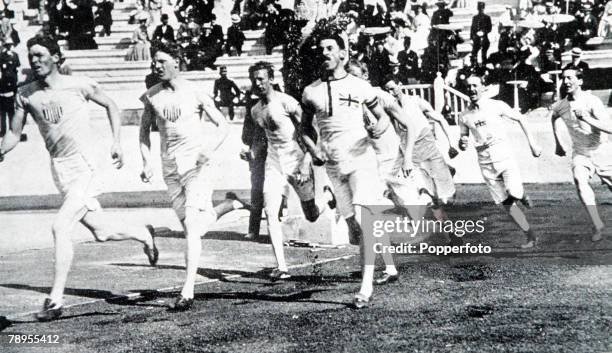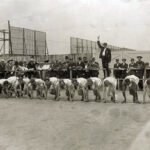When Athens served as host of its second International Olympic Games, in 1906, more events were held and more countries participated than in the first three modern Games. With better athletes and more of them, the competition was fierce and entertaining, resulting in the most satisfying Olympics to date. As in the previous Games, Americans dominated the athletic competition, led once again by standing jumper Ray Ewry and thrower Martin Sheridan. Both had won in St. Louis and would repeat their victories in London. William Sherring of Canada won an emotionally charged marathon.
The 1906 Games, often referred to as the Intercalated Olympic Games, introduced some important permanent Olympic customs, including the parade of the nations’ teams in ranks around the track, now the first major event at all opening ceremonies. Olympic scholars agree that, after the fiascoes of 1900 and 1904, the well-organized and highly successful 1906 Athens Olympics probably saved the entire Olympic movement from an early demise.
These Games, however, are not included in the official IOC lists. The rest of the IOC, over Coubertin’s objection, had agreed that Athens would hold Olympics every two years in between the other Olympiads. Coubertin feared more Olympics in Greece would bolster the popular proposal that Athens become the permanent Olympic site. He later “vetoed” the results of the 1906 Games and retroactively withdrew IOC status from them, even though he himself had listed them as official IOC Games in his 1906 Olympic Review. In 1948 the IOC executive board, at Avery Brundage’s urging and without discussion, rejected a scholarly petition from another IOC member who sought to reinstate the 1906 Games. In 2003 the IOC executive board once more rejected a carefully argued and well-documented petition from the International Society of Olympic Historians asking that the 1906 Games again be recognized as official. As in 1948, the matter was not even submitted to a vote.
Sports at the 1906 Games
- Athletics (Track and Field)
- Aquatics (Swimming)
- Archery
- Boxing
- Cycling
- Fencing
- Football(Soccer)
- Gymnastics
- Rowing
- Shooting
- Tennis
- Weightlifting
- Wrestling
- Diving
- Polo
- Rugby
- Tug of War
- Wrestling (Greco-Roman and Freestyle)
- Jeu de Paume (similar to real tennis)
- Lacrosse
Key Facts about the 1906 Games
- Hosted in Athens, Greece, at the Panathenaic Stadium
- Featured 20 sports with 78 events
- Included around 900 athletes from 20 nations
- First Games to introduce:
- The opening ceremony with athletes marching by nation (still used today)
- The first official Olympic village
- The first closing ceremony


